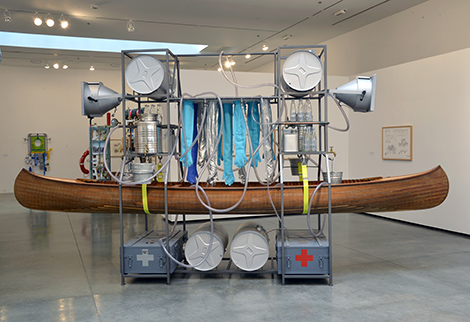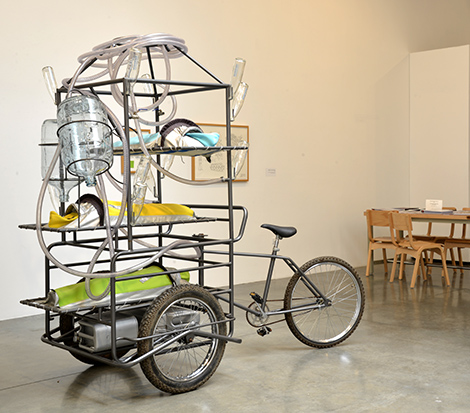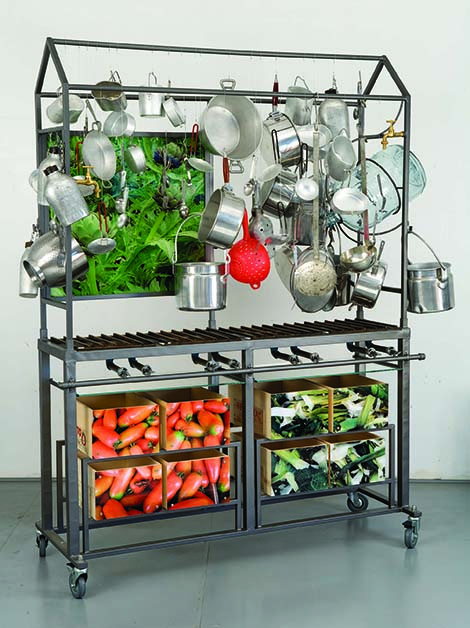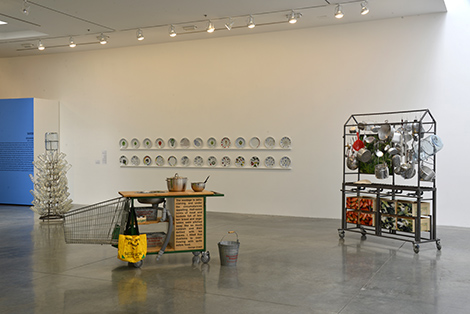“FOOD – WATER – LIFE” presents a sort of equation, a distillation of concerns about immigration, labor and meaning in a globalized economy that drags our personal lives along for the ride.
Married French artists Lucy+Jorge Orta construct a figurative Ikea catalog of our humanitarian anxieties. Cargo ship safety gear is slung over a dugout canoe atop a first-aid kit in their OrtaWater —Fluvial Intervention Unit (2005). This frenetic mash-up of industry, indigenous transport, and Western medicine yields no space for the viewer: the canoe’s headroom is much too low to accommodate a rower—and to where can one travel without a paddle?
The premise of Fluvial Intervention Unit is stranded by the tools at hand. International efforts by NGOs and relief task forces are rendered impotent, satirized by aesthetics. Emergency aid is implied by the water casks, tricycle, and steel frame of their OrtaWater—Mobile Intervention Unit (2005), but is ultimately untenable by fault of size and proportion. As physical access is questionable within the cartoonish constraints of their apparatuses, so the global humanitarian effort is cast as a garish impulse fettered by bright objects, a mere stage set.
The Ortas mean to disturb, their “functional objects” asserting blankness without patina or even promise of use. Each installation appears to block our entry as food crates and canteens lie empty, enforcing an eerie anonymity. The Orta’s installations suggest rescue, yet they are props of heroism without the hero: the body, the individual, remains maddeningly absent, underscored by ambient cooking sounds playing on loop in Mexican Kitchen (1997–2008). Have they just left the room, or have we?
Global rescue efforts stand dreamlike, incompatible with the hand dealt by the Ortas. While functionalism has been a controversial foe and friend to the art world, threatening the very soul of “art for art’s sake,” the Ortas playfully toy with our need to save the world. By turns irreverent and empathic, their sculptures dance around hallowed ground. The Ortas’ installations are as antithetical to function—and yet as topical to it—as their show’s title suggests, striking a frustrating dissonance when the stakes are as high as the world itself.
The Ortas’ insistence on function as perpendicular to meaning instead of parallel is the heart of their cynical playfulness. As viewers, we are led on this functional and operational roundabout back to the obvious: art is a way to think more than it is a way to do.
“FOOD – WATER – LIFE” guides us to think and feel about issues where only action seems fitting. When human lives are at stake, anything less than action seems worse than useless; it seems cruel. The Ortas force us to be exactly what we are in the gallery space: viewers, perfect and passive bystanders. But for their highlighting of dire global needs and human welfare, we wouldn’t have questioned this ill fit between what needs to be done and what we are doing.





